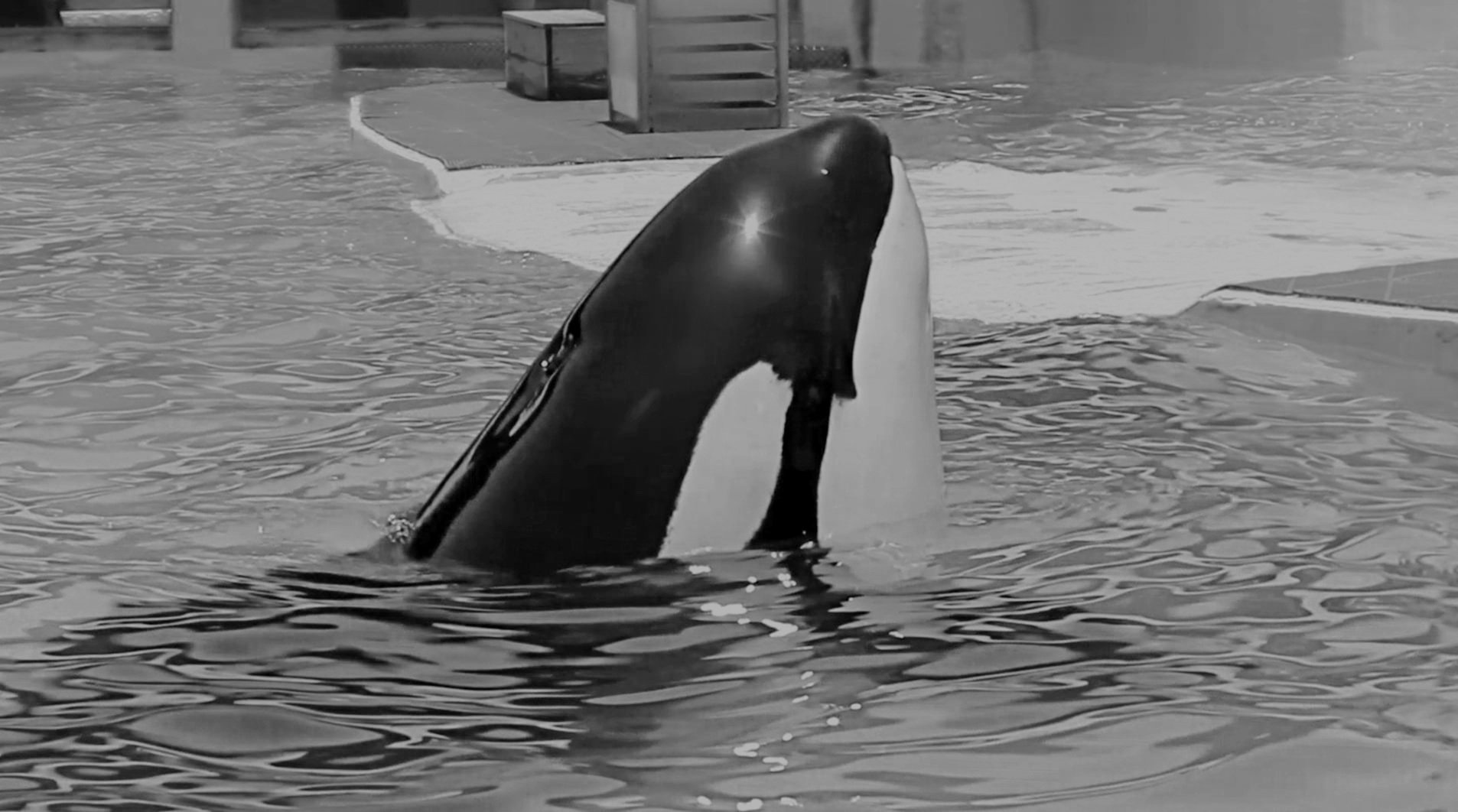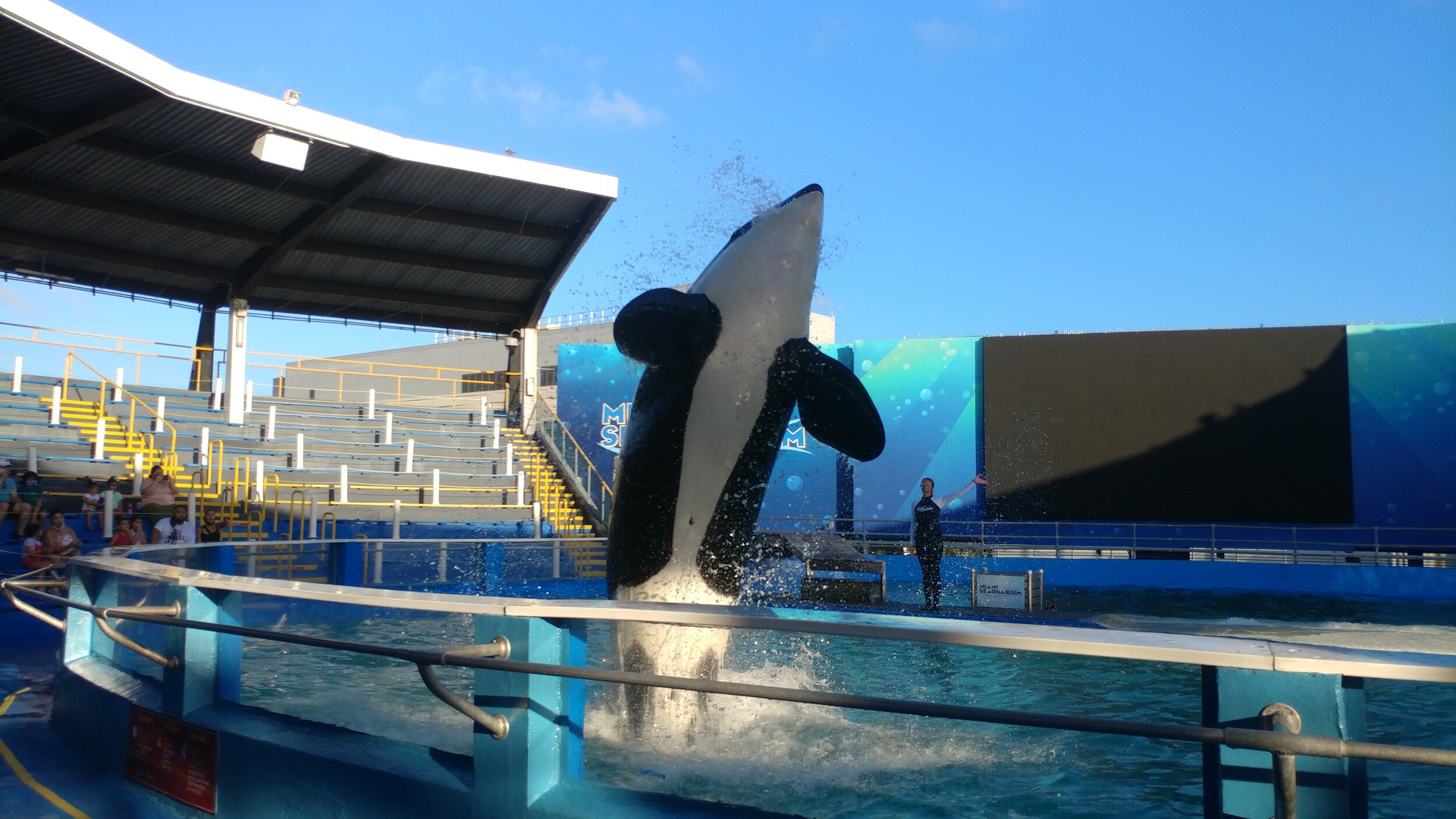
Tokitae ~1965-2023.
In Memory of Tokitae/ Sk'aliCh'elh-tenaut/Lolita
With heavy hearts and tears in our eyes Orca Network shares and confirms the news that Tokitae/ Sk'aliCh'elh-tenaut/Lolita, passed away Friday, August 18, 2023 at the Miami Seaquarium around 4 pm Eastern Time, surrounded by her loving care team and veterinarians, who did everything they could to save her after a very short illness. She developed a gastrointestinal issue two days ago for which she was receiving treatment, and then today suddenly developed acute renal failure and could not be saved despite the best efforts of the veterinary team. More information will be available in the coming days. For now, we ask for everyone's prayers and respect, while our Orca Network pod grieves for this huge loss.
One thing that brings us comfort is knowing that as Toki began struggling and was on her journey home to the next world, her entire family was off the west side of San Juan Island in what these days is a rare gathering, with all three pods swimming up and down the island, socializing in a Superpod; and the L12s are still there today. This is often a cultural/social ritual to mark a significant event in their community, and we believe they were welcoming her home.
Toki is finally home, not the way we wanted, but her family seems to know she is with them once again, in ways we may never comprehend.
Toki watching her family on the big screen!!
May, 2023 - Tokitae's Journey home picks up momentum
Thanks to everyone who has been part of this decades-long journey to retire Tokitae in her natal waters. Toki has brought so many together, and she is finally coming home soon.
It is so important for us now to all come together, believe in her strength and courage, and move forward with positive intention that Toki is coming home, and all of us can help.
Toki has mentored us all with her awesome resilience and fortitude, indomitable spirit and engaging personality. She has healed and transformed everyone she meets, and has put us on this path to reunite her with her home.
For the first time in three decades, the resources needed are in place. The talent, skill and knowledge of the "Friends of Toki" team is huge. Squil-le-he-le (Raynell Morris) Tah-Mahs (Ellie Kinley), Shirley Bob and other Lummi and tribal spiritual leaders have done and continue to do the spiritual work to prepare the way for Toki's journey home.
She is ready. We are ready. As always, Toki will lead the way, and show us the way.
Susan Berta and Howard Garrett
Cofounders, Orca Network
Watch KING5 TV’s 10-day Special Series: An exploration of the efforts to return Tokitae, an orca captured in Puget Sound in 1970, to her native waters after decades in captivity, from May 22nd to the full hour special May 31st, 7 pm Pacific Time.
For further updates, join our Orca Network/Tokitae Facebook group, check out KING 5 TVs Facebook page or website, or:
For the link to watch all episodes of Tokitae's Journey airing on KING5 May 22nd - 31st, text TOKI to 206-448-4545. Or see the Full YouTube playlist of all episodes of Tokitae’s Journey.
March 30, 2023 - We now have all the elements needed to move Toki home. First of all Toki herself, looking good, eating well, active and engaged, deemed ready to travel by her veterinarians. She’s also probably bored much of every day and night, as she has been for almost 53 years. She needs to be home for her physical and emotional health. The Merck Manual of Veterinary Medicine says that the most therapeutic condition for any marine mammal is the closest approximation to its natural habitat. So Toki’s actual natural habitat is the healthiest place for her. The industry has conditioned the public to believe her habitat would be harmful to her, which is opposite of the truth.
Toki was the whale in the room at the news conference in Miami today. Everyone who spoke declared their love for her, and their respect and admiration. Toki is the unifying force who brought us all together to carry her home. Love of Toki united park owner Eduardo Albor with animal welfare philanthropist Pritam Singh, woven together by Miami-Dade Mayor Cava and Commissioner Regalado, harmonized with spiritual guidance by Lummi elder Raynell Morris and the diplomatic graces of Charles Vinick, and now Jim Irsay comes in to offer his good heart and deep pockets to make it all happen.
This is now more than just a team, they’re a force field able to plow through the permitting process, seapen site selection and design, legal processes, budgeting handiwork, public involvement and presentation, all in a spirit of shared affection, respect, and reverence for Toki.
The humans got it right today in Miami and everywhere that her life story became known or better known, not just as victim of an atrocity but as our family member and teacher who is showing us how to treat her and how to treat each other. We saw Toki’s handiwork at that table in Miami. We’ll see much more to celebrate in coming days and months.
She is well, she is whole, and she is well on her way to swimming and diving in her real natural home now.
Marine Biologist Ken Balcomb’s Comprehensive Retirement Plan
. Prepared by Center for Whale Research, Friday Harbor, WA 98250 April, 1995
For the Annual Meeting of the Association of Zoos and Aquariums

There is little risk to Tokitae in any stage of her retirement in her native waters. She will be examined by veterinarians prior to transport to detect any potential diseases. Remaining in captivity would likely result in mental and physical stresses.
Lolita/Tokitae/Sk’aliCh’elh-tenaut can and should be returned to her native waters
Transport is not dangerous or highly stressful.
Toki’s teeth are in excellent condition.
Photo: Anne-Marie Van Dijk
For over 50 years marine parks have often moved orcas of all ages long distances, yet none have been harmed in transit. Keiko was near death when he was successfully flown from Mexico City to Oregon. When she is cleared for travel Tokitae will be returned to her home by professional handlers, with her veterinarian and trusted trainers, in a comfortable fleece-lined stretcher that is placed in a large container half full of chilled water for her journey home.
Tokitae does not appear to be psychologically harmed by long-term captivity
Toki is engaged and interested in people. She doesn’t show distressed behavior or stereotypies many captive orcas do
Toki keeps herself fit – she does power laps around her tiny tank (as seen on Toki TV) – in her native habitat she will feel energised and have much more space to exercise.
Tokitae is not geriatric
“The natural lifespan of females can reach 80 to 100 years” –Ken Balcomb on TokiTV. In her mid-fifties, Toki could easily have 2 or 3 more decades of active life, in her native habitat.
Tokitae’s native habitat will be therapeutic for her
“The general aim in maintaining marine mammals in captivity is to duplicate their natural environment as closely as possible.“ –Merck Manual of Veterinary Medicine
“The chronic stress of living in tanks weakens their immune systems and leaves captive orcas vulnerable to well-known opportunistic infections” –Dr. Lori Marino (The Culture of Killer Whales).
She will be able to use her echolocation to catch live fish (Echolocation by killer whales (Orcinus orca) while in pursuit of live fish).
In Miami, Toki’s tankwater is drawn from Biscayne Bay, where: “Drainage has permitted agricultural and suburban development in areas that were once vital wetlands and increased the flow of pollutants/nutrients to Biscayne Bay.” –US Army Corps of Engineers
Tokitae’s home waters will be familiar to her
She still calls in the L pod family dialect her family taught her. A recording of Toki making L pod calls was made in the early 1990s that has been identified by at least two experts as being L pod calls). Learned calls are indelibly imprinted in orcas from birth and are remembered for life.
“Remarkably, these (biological) adaptations are all based on behavior choices and learned cultural traditions adopted by each orca community” –Dr. Lori Marino (The Culture of Killer Whales)
Research shows that dolphins have the potential for lifelong memory for each other regardless of relatedness, sex or duration of association. This study shows that social recognition can last for at least 20 years in dolphins and the first large-scale study to address long-term memory in a cetacean.” Decades-long social memory in bottlenose dolphins. –Bruck, Jason N. (2013).
Returning home will be energising for Toki
Orcas are well-developed at birth and are catching their own food around their first birthday. Toki was 4 when captured so she learned how to catch her own fish and was participating in family traditions such as food sharing.
Before her capture Tokitae was communicating with her family, and knew how to behave as a member in good standing in her community.
Orca brains have a highly developed paralimbic system, not present in humans, related to empathy, emotions, and long-term memories.
Toki knows who she is and has retained her cultural traditions. Cultural learning and identity as family members are deeply engrained in orcas.
“A sanctuary offers more choices, more challenges, and more stimulation to captive cetaceans.” –Dr Naomi Rose
“There is no inherent biological or physical reason why rehabilitation/ocean training cannot be prescribed for any of these naturally hardy animals, even after prolonged captivity.” A Proposal to Rehabilitate and Ocean Train Keiko for Potential Reintroduction to the Wild –Ken Balcomb
Orcas have very big brains, perhaps the largest of all animals, which implies long memories, and nothing is more important to an orca than their family and traditions, and how to catch their special diet. She will recognize her native waters and will likely feel excited and energized to be home again.
Keiko healed and thrived in a larger tank containing natural seawater in Oregon. Keiko then became even healthier in Iceland. According to Bob Ratliffe, Executive Director of the Free Willy/Keiko Foundation (Newport News Times, Sept. 9, 1998): “As soon as he is immersed, Keiko pumps his flukes to swim clear of the stretcher and immediately dives. He surfaces a full minute later, circling the pool, echolocating and vocalizing excitedly, as if calling out “Who's there?” After 10 minutes of energetically exploring his new home he turns to his human friends perched at the pool's edge. He allows Jen Schorr to scratch him briefly, but seems more interested in the place than the humans. Keiko is vocalizing like he's never done before – much more than when he was in Oregon.”
September 12, 1998: Keiko's activity level is much higher than it was in Oregon. He begins "porpoising," coming smoothly out of the water in a continuous, graceful arc to breathe and slipping immediately beneath the surface again. In the past he often stayed at the surface following a breath. Dr. Cornell is visibly moved by Keiko's response so far. “As a veterinarian, Keiko's medical supervisor and a human being,” he says, pausing to regain his composure, “it can't get any better.” In late September, winds of over 130 mph lash the baypen. Staff and Keiko come through unharmed. Baypen repairs continue through the winter months.
Toki can heal in the Salish Sea
Food-sharing
Toki learned to share salmon as a member of her family before her capture. Foraging by resident killer whales was found to frequently involve sharing by 2 or more whales. –John K. B. Ford, Graeme M. Ellis
When Keiko was returning fish to trainers he was likely practicing the tradition of sharing food he learned prior to his capture.
Is Toki habituated to humans?
While Toki is comfortable interacting with human companions, she was taught by her family how to be a Southern Resident orca. That early learning does not disappear no matter how many years they are separated. “The complex and stable vocal and behavioural cultures of sympatric groups of killer whales (Orcinus orca) appear to have no parallel outside humans, and represent an independent evolution of cultural faculties.” (Culture in Whales and Dolphins, Rendell and Whitehead 2001)
Toki possesses self-awareness as a member of the Southern Resident orca community. Lone orcas, such as Luna and Springer, sought out human company as substitute family after they were separated from their own families, but Springer eagerly rejoined her natal extended family when given the opportunity.
Is Toki stressed by changes in her environment?
Some say that Toki is stressed by any changes in her environment, such as if her food is cut in a way she is not accustomed to. However, she has endured many changes over the years, such as Hugo’s death by apparent suicide in 1980, without lasting emotional distress
Salish Sea water is clean and clear
“Concentrations of harmful legacy metals and persistent organic pollutants such as polychlorinated biphenyls (PCBs) and polybrominated diphenyl ethers (PBDEs) have been decreasing in animal and plant life over time in many locations.“ –Executive Summary: Health of the Salish Sea Report
Would Toki carry pathogens to the Salish Sea?
Toki can be tested for every known pathogen and quarantined by double netting to be certain there is no significant danger for her and her family.
Toki appears to have a healthy immune system. She will be well fed, get plenty of exercise, and have constant medical supervision.
She will be examined regularly and treated for any issues.
How did Lolita/Tokitae/Sk’aliCh’elh-tenaut get her names?
When she was chosen in 1970 to be sent to the Seaquarium by their veterinarian, Dr. Jessie White, he named her Tokitae, which is a coastal Salish Native American word meaning "Nice day, pretty colors," that was a universal greeting among the many tribes around the inland waters. She was fortunate that Dr. White cared about her, and said at the time that Tokitae was "so courageous, and yet so gentle."
Shortly after she arrived in Miami however, the owners decided to give her the stage name "Lolita" so that's how the public knows her. The trainers and staff still prefer to call her Tokitae, or "Toki," so that's the name she's used to hearing.
In 2017, the Lummi tribe of northwest Washington, whose ancestral waters are the same as the Southern Resident orcas' core habitat (between Vancouver Island and NW Washington mainland), resolved to bring her home as a member of their ancestral family. The Lummis gave her the name Sk'aliChelh-tenaut. Lummis call the J, K, and L pods of the Southern Resident orcas by their Lummi family name, Sk’aliCh’elh (Sk’aliCh’elh-tenaut means “daughter of Sk’aliCh’elh”).
For news about Tokitae, and Free Lolita Updates since 1998, see:
Lolita/Tokitae/Sk’aliCh’elh-tenaut Updates.
See TokiTV, our weekly gathering every Sunday at 4PM Eastern, 1PM Pacific,
to inform, learn, celebrate and pray for our beloved Tokitae.
Latest news on Lolita
-

Take Action
Join the fight for Tokitae’s retirement. Here’s what you can do.
-

Tokitae's Story
How she was raised, then captured, and how she’s survived.
-
Sk'aliChelh-tenaut Retirement
.Comprehensive Operational Plan for her return to the Salish Sea.





